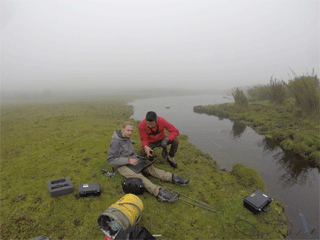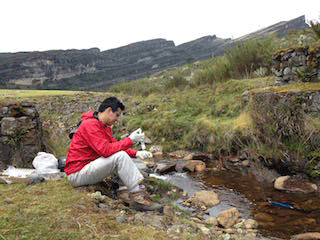Recent News
Ferenchak named chair of Transportation Research Board Pedestrian Committee
October 31, 2025
Ferenchak named APBP 2025 Research Professional of the Year
October 1, 2025
UNM professor to speak at TEDxABQ event
September 24, 2025
NSF funds research to investigate whether treated wastewater can help mitigate water scarcity in arid regions without compromising river ecosystem health
September 2, 2025
News Archives
Dr. Gonzalez-Pinzon and Graduate Student Conduct Field Work in Colombia
May 18, 2015
April / May 2015
 Dr. González-Pinzón and Ph.D. student Jake Mortensen conduct field work with colleagues from Univ. of North Carolina in an alpine, tropical river system near Bogota, Colombia.
Dr. González-Pinzón and Ph.D. student Jake Mortensen conduct field work with colleagues from Univ. of North Carolina in an alpine, tropical river system near Bogota, Colombia.
During this field trip, Dr. González-Pinzón presented seminars at the National University of Colombia and University of Los Andes.
Significant amounts of carbon are buried in tropical, alpine regions due to their exuberant vegetation and low temperatures. In these paramo systems, the semi-constant rainfall events help mobilize vast amounts of CO2 from terrestrial ecosystems, which results in remarkably high CO2 efflux rates from streams to the atmosphere.
Tropical, alpine regions are significant components of the carbon cycle not just regionally but also globally. These alpine regions have the potential to contribute disproportionately higher amounts of CO2 to the atmosphere than any other region in the tropics and similar to the regions with higher known contributions in the world (i.e., boreal sytems). Ricardo González-Pinzón and his Ph.D. student, Jacob Mortensen, worked with Diego Riveros-Iregui's research team from Univ. of North Carolina to collect hydraulic, hydrologic and biogeochemical data to characterize CO2 emmisions and metabolic processes in a wetland-stream system located in Chingaza National Park (11150 ft altitude), Colombia (South America). The results of this research will be published and will contribute preliminary data for upcoming research proposals.
Chingaza National Park is located in an Andean-Amazon biome and  hosts the headwaters of the Amazon and Orinoco Rivers. This park is located in one of the rainiest and most vegetated and biodiverse regions in the world.
hosts the headwaters of the Amazon and Orinoco Rivers. This park is located in one of the rainiest and most vegetated and biodiverse regions in the world.
